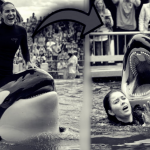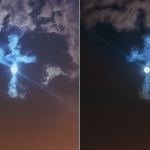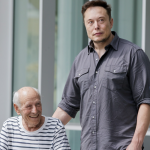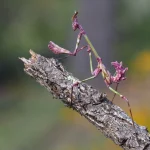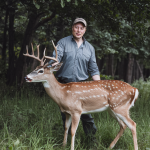Even in the Mud: A Story of Devotion, Fear, and Unyielding Love
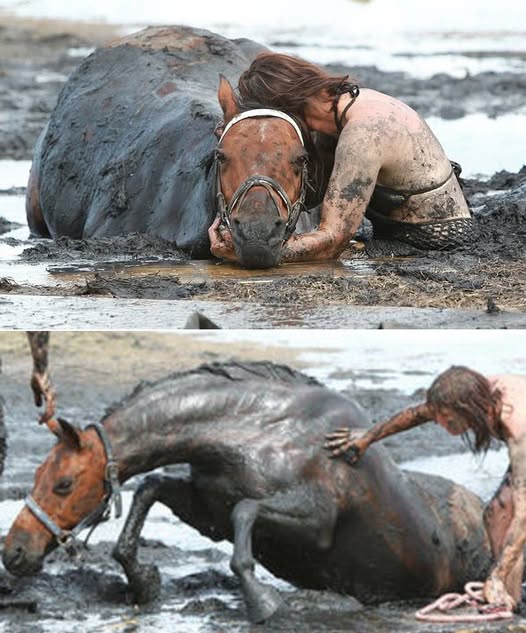
: A Story of Devotion, Fear, and Unyielding Love
It was supposed to be a calm, ordinary afternoon. The kind of day where the sun stretches gently across the sea, the waves whisper along the shore, and the horizon melts into a soft, golden haze. Avalon Beach, Australia — a serene place where horses can gallop along the coast, hooves thudding gently on the wet sand, wind tossing manes and tails like flags of freedom.
For Nicole Graham, it was just another ride with her beloved horse, Astro — a majestic 18-year-old gelding who had been her companion for over a decade. They had ridden this beach many times. There was a deep understanding between them — a silent language of trust built from years of shared adventures, gentle grooming, and the quiet rhythms of companionship. Nicole loved Astro not as one loves a possession, but as one loves a family member. He was not just her horse; he was her partner, her friend, her soul in a different shape.
But on this particular day, that quiet routine was shattered in an instant.
The Sinking Begins
Without warning, Astro’s hooves sank into what appeared to be ordinary wet sand — but it wasn’t. It was treacherous, deep, suffocating mud, deceptively calm on the surface but dangerously unstable beneath. Before either of them could react, his massive body — nearly 500 kilograms of muscle and strength — began to descend. Panic flared in his wide, intelligent eyes. He thrashed instinctively, but every movement only pulled him deeper into the thick sludge, like quicksand.
Nicole leapt off him immediately, trying to help him regain his footing. But it was too late. The mud was merciless. Within moments, Astro was trapped up to his chest. Then his neck. Then his shoulders disappeared. The more he moved, the more the mud seemed to claim him.
And then, the most horrifying realization: the tide was coming in.
A Choice in the Sludge
Nicole could’ve left.
She could’ve called for help from a safe distance, avoided the risk of being trapped herself. She could’ve thought logically — detachedly — and reasoned that her life was more valuable, that a human life outweighed the life of a horse.
But she didn’t.
Instead, she did something extraordinary.
She stayed.
Waist-deep in the freezing, sucking mud, she wrapped her arms around Astro’s head. She held it above the sludge to keep him from drowning. The minutes passed. Then hours. She didn’t move. She didn’t retreat. She didn’t even let herself consider the option of walking away.
She knelt beside him, in the muck, in the fear, in the absolute helplessness of the moment — and she held on.
Her hands stroked his face. Her voice whispered to him, over and over, soft and shaking.
“I’m here. I’m not leaving you. Stay with me.”
When his panic surged, she calmed him. When his muscles trembled and fatigue threatened to drag him under, she wept — not out of weakness, but out of defiance.
She cried with him. Not for him.
Because love, real love, doesn’t turn away from suffering. It leans into it.
Time, Mud, and the Rising Tide
As the tide crept steadily closer — salt water beginning to edge around them like a silent executioner — rescue workers finally arrived. But they were facing an impossible scene. A horse of Astro’s size, nearly submerged, immobilized, and minutes away from being engulfed by the sea.
Nicole had now been in the mud with him for nearly three hours. Her limbs were numb. Her body ached from the strain. Her skin was cold and raw. But she still wouldn’t let go.
And Astro? He was shaking, exhausted beyond belief, but still breathing — still alive — because she had never let his head fall beneath the surface. Because she never stopped telling him he could make it.
Veterinarian Stacey Sullivan was called in. She made the critical decision to sedate Astro to keep him calm for extraction — a risky move, but the only option left. With precision and care, she administered the sedation as the tide now licked hungrily at the horse’s sides.
Then came the machinery. A local farmer had brought a tractor strong enough to attempt the impossible: pulling a 500-kilogram horse out of a literal death trap without causing him further injury.
Slowly, carefully — inch by inch — they lifted Astro from the grave of sludge. The mud fought back. Gravity resisted. Time was nearly out.
But then — a shift.
A lurch.
A groan of gears.
And suddenly, Astro was free.
Not dead. Not drowned. Not lost.
Free.
Aftermath of a Miracle
Astro collapsed onto solid ground, shaking, breathing hard, but alive. Nicole collapsed too — not from weakness, but from the sheer weight of what she had carried, emotionally and physically.
Three hours in the mud. Three hours of staring death in the face and refusing to back down. Three hours of choosing love over logic. Faith over fear.
Later, Nicole would describe the experience not with grandeur, but with simple truth:
“It was terrifying. But I couldn’t leave him. He’s my best friend.”
She didn’t make headlines for heroism. She didn’t ask for praise. She simply did what love demanded.
And in doing so, she reminded the world of something many have forgotten:
That real love doesn’t run away.
It doesn’t disappear when things get hard.
It doesn’t retreat when the weight of someone else’s survival feels too much to carry.
It stays.
Even in the mud.
The Deeper Lesson
This story is more than a tale of one woman and her horse. It’s a symbol — a mirror for us all.
In a world that often tells us to let go, to protect ourselves first, to run from discomfort, Nicole Graham’s actions whisper something deeper:
-
Hold on.
-
Stay close.
-
Don’t give up on those who need you — even when the world says it’s hopeless.

Because the mud in this story isn’t just mud.
It’s illness.
It’s aging.
It’s depression.
It’s failure.
It’s grief.
It’s all the hard, messy, painful parts of life that threaten to pull us under when we’re at our weakest.
And the people trapped in that mud — they don’t need someone to save them from a distance. They need someone to kneel beside them, whisper hope, and keep their head above water until help comes.
Just like Nicole did.
The Legacy of Love
Astro recovered fully in the weeks that followed, thanks to medical care and rest — but mostly thanks to Nicole’s unwavering presence. The story spread quietly across the world, not as a viral sensation, but as a beacon of what’s still possible in the human heart.
And today, if you visit a beach, or pass by a field with horses grazing lazily in the wind, maybe you’ll think of them. Of Nicole. Of Astro.
Of what it means to stay.
And if someone in your life is caught in their own mud — despair, loneliness, confusion, or pain — perhaps you’ll remember this:
You don’t have to have all the answers.
You just have to stay.
To kneel in the fear, the cold, the unknown… and hold on.
Because love doesn’t leave when things get heavy.
It holds on — even in the mud.
